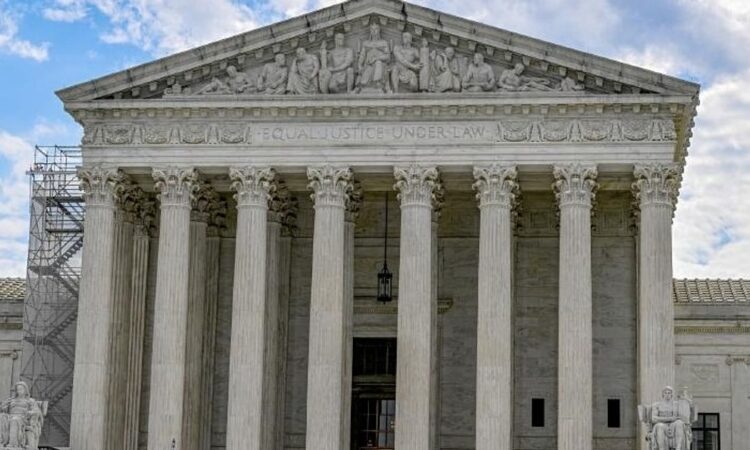
Washington: The US Supreme Court on Thursday upheld the Consumer Financial Protection Bureau’s funding mechanism in a challenge brought by the payday loan industry, handing a victory to President Joe Biden’s administration and a setback to the agency’s conservative critics.
The 7-2 decision, authored by conservative Justice Clarence Thomas, reversed a lower court’s ruling that the CFPB’s funding design violated a provision of the US Constitution called the “appropriations clause” giving Congress the power of the purse. The agency draws money annually from the Federal Reserve instead of from budgets passed by lawmakers.
“For years, lawbreaking companies and Wall Street lobbyists have been scheming to defund essential consumer protection enforcement,” an agency spokesperson said. “The Supreme Court has rejected their radical theory that would have devastated the American financial markets. The court repudiated the arguments of the payday loan lobby and made it clear that the CFPB is here to stay.”
Thomas wrote that the CFPB’s funding design was constitutionally sound.
“The statute that authorizes the bureau to draw money from the combined earnings of the Federal Reserve System to carry out its duties satisfies the Appropriations Clause,” Thomas wrote.
The CFPB was established under a law signed by Democratic former President Barack Obama in 2010 to curb the kind of predatory lending that contributed to the 2007–2009 financial crisis. The agency has delivered more than $20 billion of relief to consumers including a $3.7 billion settlement in 2022 with Wells Fargo.
Many conservatives and their Republican allies have portrayed the CFPB as part of an overbearing “administrative state,” the network of agencies responsible for the array of federal regulations affecting businesses and individuals.
Justice Samuel Alito wrote on Thursday in a dissent, joined by fellow conservative Justice Neil Gorsuch, that the ruling “turns the Appropriations Clause into a minor vestige.”
“The court upholds a novel statutory scheme under which the powerful Consumer Financial Protection Bureau (CFPB) may bankroll its own agenda without any congressional control or oversight,” Alito wrote.
“The Framers would be shocked, even horrified, by this scheme,” Alito added, referring to the Constitution’s 18th century authors.
The justices, who heard arguments in the CFPB case in October, are expected to rule by the end of June in other cases with the potential to curb the power of other federal agencies including the Securities and Exchange Commission.
Republican opposition to CFPB
Republican lawmakers overwhelmingly opposed the CFPB from the start, contending it wields too much power and burdens banks and other lenders with unnecessary red tape.
Patrick McHenry, who chairs the US House of Representatives Financial Services Committee, said his fellow Republicans will continue to press for legislation ensuring that “the CFPB is held accountable to the American people,” calling it a “rogue” agency.
In contrast, the CFPB spokesperson called the ruling “a resounding victory for American families and honest businesses alike, ensuring that consumers are protected from predatory corporations and that markets are fair, transparent and competitive.”
Prominent pro-business groups including the Chamber of Commerce backed the payday lenders in the case.
Payday loans are short-term and high-interest loans typically due on the borrower’s next payday after the loan is made, with the annual percentage rate usually steep – 390% or more, according to the US Federal Trade Commission.
In 2018, the Community Financial Services Association of America and the Consumer Service Alliance of Texas, trade groups representing the payday loan industry, sued the agency, taking aim at a 2017 regulation designed to curb “unfair” and “abusive” practices by certain high-interest lenders. The regulation stops lenders from trying to charge a borrower’s bank account after two unsuccessful attempts in a row.
A federal judge in 2021 sided with the CFPB. But the New Orleans-based 5th US Circuit Court of Appeals in 2022 ruled that the funding structure violated the appropriations clause in a decision that also invalidated the regulation at issue.
The Supreme Court, with its 6-3 conservative majority, has taken a dim view of expansive authority for federal agencies including the Environmental Protection Agency in some important rulings in recent years.
Biden’s administration had told the Supreme Court that invalidating the CFPB’s funding arrangement could have endangered similarly structured agencies including the Federal Deposit Insurance Corporation, Office of the Comptroller of the Currency and the Federal Reserve Board.
Supporters of the agency also had said a ruling against the CFPB would leave consumers vulnerable to deceptive and abusive practices, and could place the CFPB’s existing regulations on shaky legal ground.
Brianne Gorod, chief counsel at the Constitutional Accountability Center liberal legal group, welcomed Thursday’s ruling.
“This is an unequivocal win for the CFPB, for America’s consumers, and for the authority of Congress to fund federal agencies and programs outside of the annual appropriations process,” Gorod said.
Published 16 May 2024, 17:10 IST






